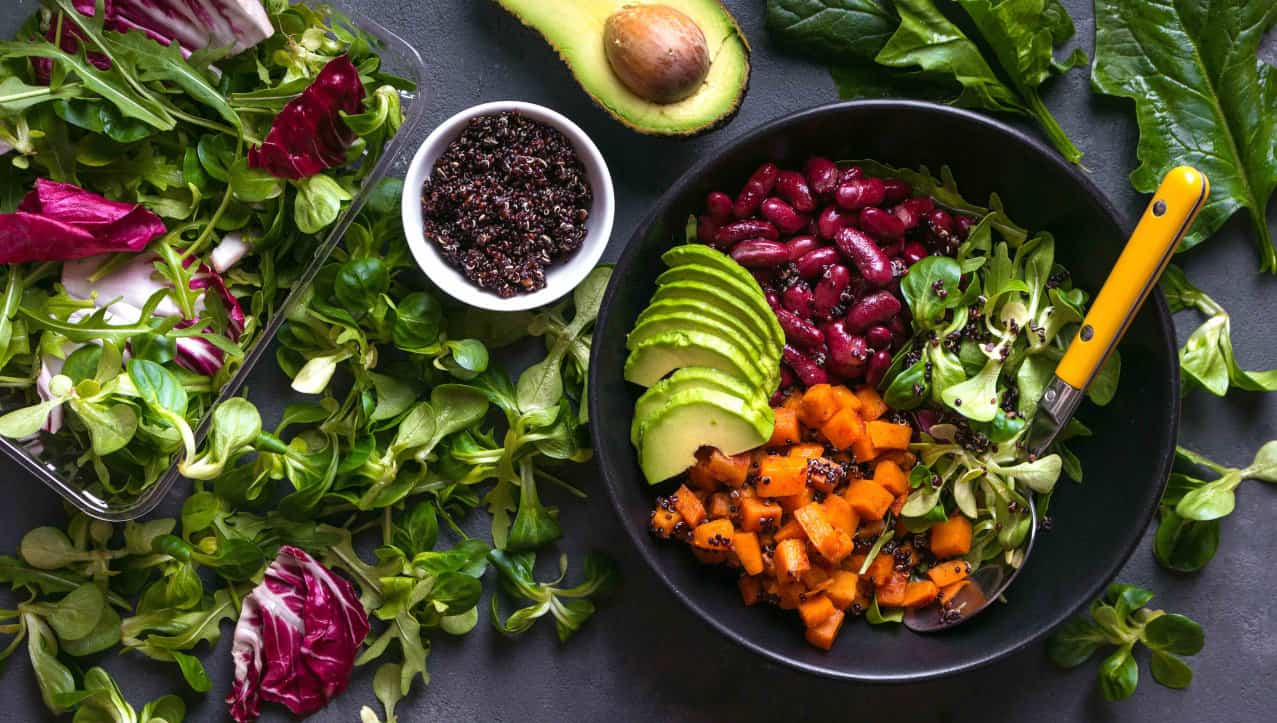Knowing the pros and cons of a vegetarian diet will aid in the decision to go vegetarian. What do celebrities Drake, Kal Penn and Zac Efron have in common? They all chose to adopt a plant-based, vegetarian diet. Toss NFL star Tom Brady into this mix as well. Brady and his wife Gisele Bundchen promote and eat mostly vegan meals. In Brady’s case, it’s a diet dominated by vegetables, electrolyte-infused water and protein shakes.
Related: Six BBQ-worthy cuts of steak for a premium, savoury summer grilling experience
Before you start throwing out your frozen chicken wings and lamb chops, it’s good to think about the pros and cons of a vegetarian to see if it’s really for you (and if you decide to go vegetarian, farther down we list the three best vegetarian restaurants in Toronto).
The Different Types of Vegetarian Diets
The vegetarian diet has many variations based on individual preferences and dietary needs. Whether you opt for a strict vegetarian or a more flexible approach, there is a diet to fit everyone’s needs. Choosing the vegetarian lifestyle that best suits you and your needs is important to maintain a balanced diet.
Lacto, Ovo, & Lacto-Ovo Types of Vegetarianism
A (lacto) vegetarian diet suggests the absence of meat, fish, poultry, or eggs. However, some vegetarians may also avoid dairy products but consume eggs, this is called an ovo-vegetarian diet. In a lacto-ovo vegetarian diet, vegetarians don’t eat red meat, fish, or fowl. But they do include eggs and dairy products in their diet (this is the most common type of vegetarian).
The Vegan Diet
When following a vegan diet, you don’t consume any animal products whatsoever or animal by-products, including honey. And there’s also the question of supplements to maximize the benefits of the food you eat. But only supplements that come from real food as these Nucific reviews shed light on. Veganism also reduces your carbon footprint and has an array of environmental benefits.
The Flexitarian Diet
Adherents of the ‘flexitarian’ diet embrace a predominantly plant-based diet while occasionally incorporating animal products in moderation. Flexitarians prioritize fruits, vegetables, whole grains, and legumes but are flexible enough to include small portions of meat, dairy, or fish on occasion for dietary variety and flexibility.
The Pros and Cons of Vegetarianism
Embracing a vegetarian lifestyle involves careful consideration of various factors, from health benefits to potential drawbacks. While many are drawn to the ethical and environmental advantages of vegetarianism, others may be concerned about nutritional deficiencies and practical challenges.
Understanding the nuances of vegetarianism’s pros and cons can help individuals make informed decisions about their dietary choices. Whether it’s weighing the benefits of plant-based nutrition against the risks of nutrient deficiencies or considering the social and cultural implications of adopting a vegetarian diet, exploring the multifaceted aspects of vegetarianism is essential for anyone contemplating this dietary shift.
Pros – Prevents Heart Disease
A vegetarian diet may help lower blood pressure and cholesterol levels aiding in lowering the risk of heart disease. This is the case because an over-abundance of red meats may include too much saturated fats which some dieticians believe raises unhealthy cholesterol levels. Following a healthy, whole foods-based vegetarian diet – including good sources of protein like beans and legumes, as well as some healthy fats – while also eliminating processed foods, will make you less likely to get heart disease.
Pros – Helps you Manage Your Weight
A diet rich in fruits and vegetables may help you lose weight, provided you don’t over-indulge in potatoes, rice and bread products. Fresh produce is also rich in fibre leaving you feeling full longer. If weight loss is your goal, a vegetarian diet can help you achieve that by moving towards a more plant-based diet.
Pros – Regulates Your Bowel Movements
Another benefit of a fiber-rich vegetarian diet is that it helps improve digestive health by keeping bowel movements regular. As well, it feeds the good bacteria in your gut.
Pro – Various Health Benefits
Switching to a Vegetarian Diet can potentially lower the risk of type 2 diabetes, but it’s not a guaranteed prevention. A well-balanced vegetarian diet, rich in fruits, vegetables, whole grains, legumes, and nuts, tends to be high in fiber and low in saturated fats, which can help with weight management and blood sugar control.
Cons – Lack of Essential Nutrients
Vitamin B12 is found mainly in animal foods and this is one of the cons of a vegetarian diet. Low vitamin B12 can negatively impact your mood, sleep and energy levels. A vegetarian diet is often low in Vitamin D, which also affects mood, and can lead to muscle pain and weakness, and brittle bones. Vitamin D also helps keep your immune system strong, and helps to produce hormones in the body, so it’s important to help ward off illness as well as to provide energy. If you choose to follow a vegetarian diet be sure to supplement with not only a good multi-vitamin that has ingredients like licorice root, but also Vitamin B12, Vitamin D and Omega 3s if you are not including fish in your diet.
Cons – Potential Hair Loss
In addition to vitamin B, meat also contains protein, zinc and iron, which are all necessary for hair growth. Protein is crucial for building the structural components of hair, while zinc supports the repair and growth of hair tissue. Iron plays a vital role in carrying oxygen to hair follicles, promoting healthy hair growth.
Conversely, a vegetarian diet may lack certain essential iron and other minerals needed for optimal hair health. Therefore, vegetarians need to ensure they incorporate iron-rich plant-based foods like lentils, beans, tofu, spinach, and fortified cereals into their diet to support hair growth and overall health.
Cons – Risk of Anemia
Another one of the downsides of being a vegetarian is that a lack of iron and certain vitamins can lead to anemia. Anemia makes you feel more tired than usual, sometimes weak and dizzy, and also occasionally leads to headaches and chest pain. People who are anemic may not experience issues at first, but over time these symptoms may worsen leading to extreme fatigue.
Things to Remember When You Become a Vegetarian
Becoming vegetarian is a personal journey influenced by factors like age, fitness, and preferences. To maximize the benefits of vegetarian diets, keep these points in mind:
- Diversify Proteins: Use meat substitutes like lentils, beans, and soy to avoid protein deficiencies.
- Gradual Shift: Ease into vegetarianism if you’re a regular user of meat products, adopt a flexitarian approach.
- Set a Start Date: Commit to a specific date to begin your transition.
- Educate Yourself: Learn about vegetarian nutrition to prevent deficiencies in necessary vitamins and minerals.
- Choose Wisely: Select nutrient-rich foods like nuts, legumes, and vegetables.
By prioritizing these steps, going vegetarian with a healthy vegetarian diet and lifestyle tailored to your needs will be a breeze.
If you like the benefits of a mostly vegetarian diet, but don’t want to completely remove meat from your life, you can try increasing your vegetable intake while at the same time reducing the amount of meat you eat on a daily basis. Alternatively some people prefer a diet that cuts out red meat but includes forms of meat and fish.
Challenge yourself to “Meatless Mondays” and see how that makes your body feel. If you notice a positive change in the way you feel, you may try including more vegetarian days. We are all unique so it’s always a good idea to listen to your body, and try to discern which foods make you feel healthy and energetic. Now that you know some of the pros and cons of a vegetarian diet, you can find the vegetarian diet that best suits your needs and lifestyle.
Top image: Shutterstock
Top 3 Toronto vegetarian restaurants

Maria Montemayor is a Filipina Canadian writer from Scarborough, Ontario. She holds an Honours Bachelor of Arts degree in English and political science from the University of Toronto, Trinity College. She has previously worked as a graphic designer, English instructor and writing contest judge.
Her writing has been published by Her City Lifestyle, the National Catholic Reporter, Nelson Education, Canadian Immigrant and other publications.








